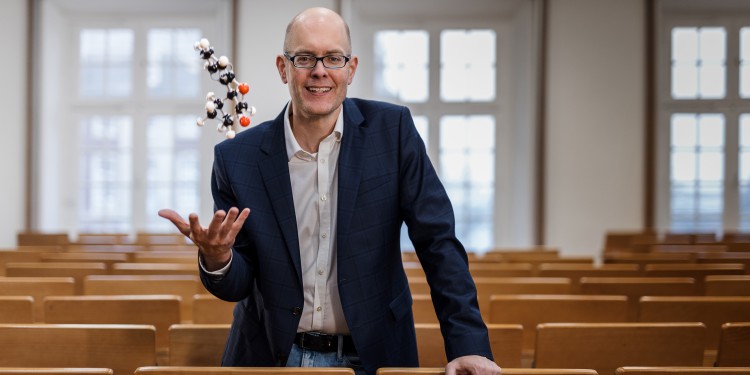
EU Research Council awards Frank Glorius with "ERC Advanced Grant
Award for top research: Chemist Prof. Dr. Frank Glorius from the University of Münster receives one of the prestigious "ERC Advanced Grants" from the European Research Council (ERC). The funding of 2.5 million euros is intended to enable the realization of an outstanding research project. Together with his team, Frank Glorius wants to develop methods of so-called energy transfer (EnT) photocatalysis with which new, pharmacologically relevant three-dimensional molecular structures can be produced - and this particularly efficiently and under mild reaction conditions that are not or hardly accompanied by undesired side reactions.
The development of new synthetic methods is considered one of the most important areas of chemical research, as access to organic molecules is the basis for many applied sciences. These include medicinal chemistry and materials science. The production of increasingly complex molecular scaffolds has gained importance in recent years. Molecules with a precisely defined three-dimensional structure are particularly sought after, since the function of a molecule depends on its exact structure.
However, the synthesis of such molecular scaffolds remains extremely difficult. This is where the new ERC project comes into play. EnT catalysis is based on the use of visible light (photochemistry). A key step here is first the absorption of the light (its energy) by suitable photocatalysts. If successful, these can then release the energy to the molecules that are to react. These molecules then enter an excited, high energy state. This allows the desired reaction sequences to start and lead to the formation of the desired products.
In the course of the project, Frank Glorius' team will also develop a digital platform based on quantum chemical calculations and machine learning. The goal is to provide chemists with easily accessible tools and statistical analyses that provide new insights and impetus for planning chemical reactions.
Frank Glorius has been a professor at the Institute of Organic Chemistry at University of Münster since 2007. He has received numerous awards for his successful scientific commitment in research. The European Research Council has already honored his achievements with an ERC Starting Grant (2010) and an Advanced Grant (2018). Frank Glorius has also received, for example, the Gottfried Wilhelm Leibniz Prize of the German Research Foundation (2013) and the Gay Lussac Humboldt Prize of the French Ministry of Higher Education and Research (2019). He has been a member of the National Academy of Sciences, Leopoldina, since 2021 and has been one of the most cited researchers in chemistry worldwide for more than 10 years. Frank Glorius coordinates the Priority Program 2363 "Molecular Machine Learning - From Fundamentals to Application and Beyond" of the German Research Foundation and, together with Prof. Dr. Martin Winter, the international research school BACCARA.
The "Advanced Grants" funding scheme is aimed at established scientists who have produced an outstanding body of scientific work over the past ten years. Other funding lines include "ERC Starting Grants" and "ERC Consolidator Grants". In total, there are almost 30 members of the University of Münster who have received at least one grant from the EU Commission in the course of their career.
